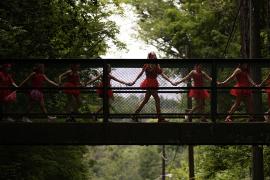The summer's tales are not all in yet, but I am sure that if this summer is like any other, the economic downturn notwithstanding, there will be plenty of stories about over concerned, hovering parents who were challenging to work with for camp professionals. There is, for example, the parent of a five-year-old day camper in the San Francisco area who was sure her child would be too traumatized by having to change for swim in front of other children unless she came in every day and held a towel up to give her daughter privacy! Or, the mother of a boy with Attention Deficit Hyperactive Disorder who, even though her son desperately wanted to go to camp, was afraid he would be too embarrassed to take his medication, which in turn would make him too unruly to get along with his cabin mates or counselors, so why bother sending him? Or the parent of a thirteen-year-old female camper who, when she was sent home because she brought vodka to camp in a water bottle and shared it with her friends at the camp pool, said the punishment was unreasonable because it would "ruin their daughter's summer."
Every camp professional has their share of parent stories. We offer them up with an almost proud enthusiasm, like badges we've earned in the line of duty. It is as if having to cope with irrational, demanding, or bad-tempered parents helps define us as members of a club of experienced professionals. To be sure, there has been a trend in parenting in the last decade that favors overinvolvement and micro-management and has tested childcare professionals around the country. Much has been written about the so-called "helicopter parent" trend of recent years — parents who are also known as alpha parents, or "get-my-kid-into-an-Ivy-League-school-at-all-costs" parent, or the "I-will-be-my-child's-best-friend-andlive-through-them-vicariously, thus-beingforever-young" parent.
And yet our response to this trend hasn't been all that inspired or convincing. It's as if we would rather swap parent stories with a kind of collective grimace than forge a balanced, rational, informed response. Sure, there will always be, as author and child psychologist Wendy Mogel so aptly puts it, "lunatic fringe" parents. (She suggests not wasting too much time or mental effort on them!) And there will always be stories that are so outrageous that they can't help but be entertaining. But if these were children acting badly, camp professionals would see an opportunity to teach, coach, or guide them to being better people. So why not parents?
There is an occupational hazard for people who work as closely with children as camp professionals do, and that is we tend to identify more with children and less with their parents. The problem with this is, once we view parents as fundamentally flawed, it is much harder for us to be empathic or caring or even calm when we engage with them. Given that it is parents — or grandparents — that pay for camp, such a critical mindset doesn't bode well for business. Furthermore, most camp people I know have taken a stand for personal growth when it comes to working with parents. After all, isn't that what we say camp is all about? This belief in growth marks us as professionals, not just in our work with children but with everyone we work with. If we believe in growth and in giving children better coping skills, then that belief should be a feature of our transactions with people in general.
Prescription for Success
The best way to gain a better appreciation of parents' point of view is to speak with them. The fall is a perfect time to issue a survey to parents, not just campers, about their experience with camp. How was the information they received before camp? What was most helpful to them in getting their kids ready for camp? How was the communication with camp once their child was at camp? Would e-mail, text, fax, or phone be better as a communication medium? How did they feel their concerns, if any, were addressed? What growth or changes did they see in their child when she returned from camp? What could make their overall experience better? These are just a few questions that can give you a better idea of how to serve your parents.
In addition to a survey, consider meeting with a group of parents — like a focus group — to find out what it is they most value about their child's camp experience — and listen to suggestions they might have about how better to share this value with other parents who may not be aware of the benefits of camp. Though many camp professionals meet with parents one set at a time in their homes, there is an advantage to meeting with a group of parents whose ideas may trigger a broader, richer discussion.
Besides spending more time getting to know your parents' perspectives, there are several other tips for improving your response to challenging parents. Always go back to your principles. What is it you and your camp truly stand for? If you haven't taken the time to articulate your principles, it is going to be difficult to keep them in mind when you are feeling challenged! If you believe in personal growth, spend some time putting into words how you see growth occurring. Most camp professionals believe that children need to learn how to thrive away from their parents, even if only for brief periods of time (in a physically and emotionally safe environment like camp), if they are ever going to be truly successful in life. While the notion of their children becoming "independent" may actually frighten some parents ("What? You mean they can live without me?!"), words like responsible, coping, and confident resonate with parents who want to, as Wendy Mogel says, give their child every opportunity to get ahead.
Find Common Ground
In her article titled, "Let the Kid Be," in the May 31, 2009, issue of The New York Times Sunday Magazine, Lisa Belkin points out that there have always been trends or fads in parenting and that the current one seems to include an attempt to give children every emotional, intellectual, and material advantage — whether for narcissistic reasons or to help their kids be ready for the uncertain world of the future.
So isn't camp an experience that gives kids an advantage? Once again, it's not just about the so-called "hard skills," like tennis or canoeing, but about coping — overcoming fears, widening horizons, navigating the social landscape. Camp is an exercise in self-reliance and social learning. Kids not only make some of their best friends at camp, they learn what real friendship is. Since campers live in groups it is also about learning the give-and-take of making decisions and getting along with all those "brothers" or "sisters" you suddenly inherit when you arrive. In a time when resilience — the ability to stick with something and recover from a setback — is a great quality to cultivate in our children, camp is an increasingly attractive option.
I can't tell you how many parents have told me how much more confident, calm, purposeful, or focused their children seem after a couple of weeks of camp. Indeed, the very thing many camp professionals complain about in parents is what makes them choose camp for their children! Learning to speak to that desire in parents could be the best way to get camp into a family's summer agenda.
Be a Better "Parent" to Your Parents
In the moment when a parent presents us with his worries or concerns about his child, we have a choice. We can be critical, in our tone if not our actual words, or we can be reassuring. Being critical may make us feel we are taking the "higher ground" in a discussion, but it often causes parents to become defensive or even intractable. Parents need reassurance about not only their child's ability, but about their job as a parent. The following is an example — a page from the advice I give parents on how they can get their child ready for camp:
The biggest question to ask is, are you ready as a parent to let your child go? Children are like little membranes — they pick up all of the subtle emotions of their parents. It helps to be clear with yourself about what your child signed up for in the first place, whether it is to make new friends, learn new skills or try out some new exciting activity or program. Think of camp as "life experience with training wheels." Camp professionals have been helping kids separate and become more independent for years. This is their true business. They tell you they teach swimming or arts and crafts or canoeing, but what they really teach is self-reliance and resilience — in other words, coping skills for kids!
Reassure yourself as a parent that you've done your job. All the advice, coaching, caring, and goodwill you've given your child over the years is in there. Trust the job you have done. They have it. Let them try out their wings even if it means they take a little nosedive once in a while! You can't make an omelet without breaking a few eggs!
It is also interesting to consider that the new economic reality may be helping to end the age of indulgent parenting. As Belkin points out, "The newest wave of mothers is saying no to prenatal Beethoven appreciation classes, homework tutors in kindergarten, or moving to a town close to their child's college campus" so they help with the homework. People just can't afford luxuries anymore, which means that if camp professionals want to be one of the options those fewer dollars go for, they need to be even better at putting into simple, parent-friendly language just what the true benefits of camp are.
References
Mogel, W., Ph.D. (2001). The Blessing of a Skinned Knee — Using Jewish Teachings to Raise Self-Reliant Children. Penguin Books.
Kindlon, D. (2001). Too Much of a Good Thing — Raising Children of Character in an Indulgent Age. Hyperion Books.
Belkin, L. (2009). "Let the Kid Be — Could the era of over-parenting be over?" The New York Times Sunday Magazine, May 31, 2009.
Bob Ditter is a licensed clinical social worker specializing in child, adolescent, and family therapy.
Originally published in the 2009 September/October issue of Camping Magazine.




